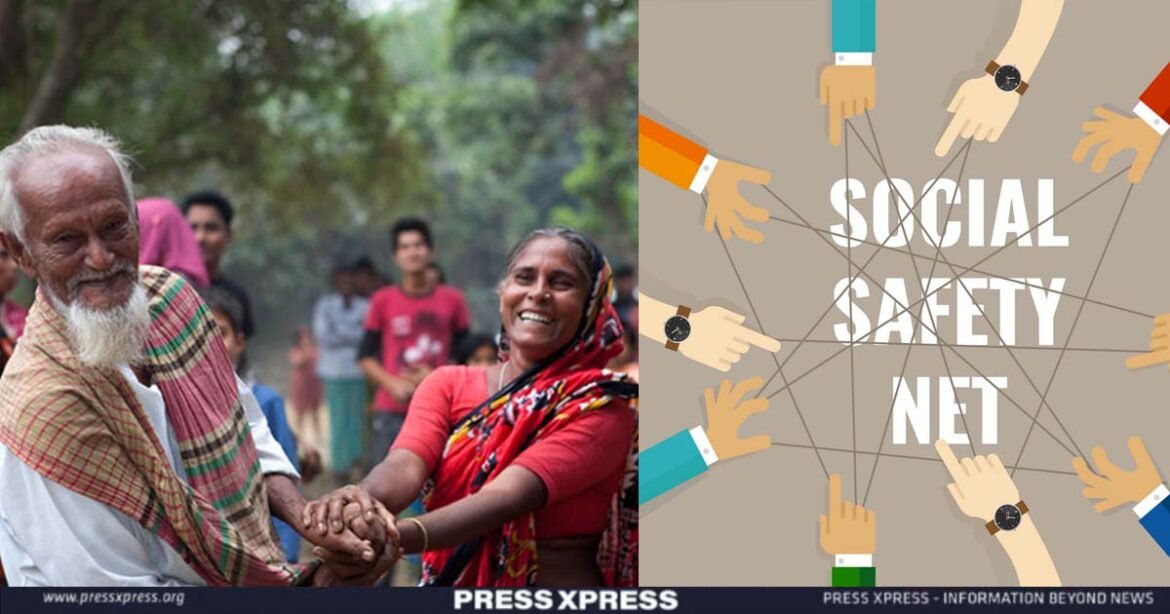Despite challenges, Bangladesh’s commitment to expanding social safety nets underscores its dedication to providing essential support to vulnerable individuals, paving the way for a brighter and more equitable future
As Bangladesh progresses from a least developed nation to a developing one, a notable policy initiative emerges, signaling the path towards a more inclusive and compassionate society. The government of Bangladesh is undertaking measures to expand its social safety net programs, aimed at providing assistance to a greater number of individuals grappling with financial hardship, particularly amidst ongoing inflationary pressures. Following a recent cabinet committee meeting on social safety net programs, a decision was made to include approximately four lakh new beneficiaries. However, the allowances provided by these programs will remain unchanged.
In a bid to enhance the efficiency of these programs and address issues such as leakage, misuse, and corruption, the finance ministry issued two circulars earlier this month introducing a new program structure.
Despite financial constraints hindering an increase in allowances, the government intends to augment the number of beneficiaries in major schemes such as the old age allowance and the allowance for widows, deserted, or destitute women. This expansion aims to extend relief to those in dire need, particularly amidst the persistent cost-of-living crisis, with Bangladesh’s inflation rate remaining above 9 percent for the past 13 months.

How can social safety schemes better prioritize serving the vulnerable?
In the current fiscal year, approximately 5.8 million elderly individuals are benefiting from the ‘Old Age Allowance’ program, receiving Tk 600 per month. This number is slated to increase by two lakhs in the upcoming fiscal year. The government has earmarked Tk 4,205 crore for this program, which caters to men over 65 years old and women over 62 years old with an average annual income below Tk 10,000.
Similarly, the ‘Widow, Deserted, or Destitute Women’ program, allocated Tk 1,711 crore for 2023-24, will extend its coverage to an additional two lakh beneficiaries. Eligible women aged 18 and above, with an annual average income below Tk 12,000, receive allowances of Tk 550 per month under this program.
While certain allowances remain unchanged, adjustments have been made to enhance support in specific areas. For instance, allowances under the Mother and Child Benefit Program will increase from Tk 800 to Tk 1,000. Additionally, senior citizens aged 80 and above will receive allowances of Tk 900 per month from FY25, compared to Tk 600 presently.

Efforts are also underway to support specific demographics, including patients with cancer, kidney, and liver cirrhosis. The number of beneficiaries under the financial support program is set to increase from 30,000 to 50,000 in the next fiscal year.
Although the Ministry of Liberation War Affairs proposed an increase in the allowance for freedom fighters, no decision has been reached by the committee yet. Currently, two lakh freedom fighters receive a monthly allowance of Tk 20,000.
Overall, the government set aside Tk 43,389 crore for 1.39 crore beneficiaries under its 10 core social safety net programs. Of them, 8 lakh retired government employees will get Tk 27,413 crore.
National ID Cards for Allowance Disbursement
A recent circular mandates that all social safety net program funds be routed through mobile financial services (MFS) linked to beneficiaries’ national ID cards by June 30, 2025. Currently, many programs disburse allowances via MFS, but without proper national ID registration, leading to misuse. Exceptions may apply for those unable to provide fingerprints or lacking national ID cards.

Comprehensive report on safety net programs
Each year, the finance ministry compiles a detailed report on social safety net programs. This year, new criteria will be included to enhance clarity on beneficiaries and regional impacts. With approximately 130 programs and a total allocation of Tk 126,000 crore for FY24, analysts raise concerns over program efficacy and misuse, prompting the ministry to demand detailed beneficiary reports from all relevant ministries by April 30. These reports will inform a comprehensive assessment in line with recommendations from the World Bank and the International Monetary Fund.
Challenges and Priorities in Bangladesh’s Social Protection System
Social protection in Bangladesh is deeply ingrained in the constitution and bolstered by national strategies, to implement a comprehensive social insurance scheme encompassing various aspects such as sickness, maternity, old age pensions, and more. Despite the existence of 114 distinct social protection programs, primarily centered on food and cash transfers, there is a pressing need for enhanced coordination to ensure the inclusive coverage of vulnerable populations.

According to the World Bank, approximately 40 million Bangladeshis live in extreme poverty, surviving on less than $1.90 per day, while an additional 30% of the population falls into the ‘vulnerable’ category, with incomes slightly above this threshold. Together, these groups constitute 70 million individuals. Prior to the COVID-19 pandemic, an estimated 13 million working-age men and women were unemployed, a figure that has surged significantly during the current crisis.
ILO’s work on social protection in Bangladesh
The ILO in Bangladesh is implementing the following social protection interventions under the Decent Work Country Program (2017-2020):
ILO’s Impactful Initiatives in Bangladesh:
- Employment Injury Insurance (EII) pilot project in RMG industry, aiding 5,100 Rana Plaza survivors.
- Bangladesh Business and Disability Network (BBDN) creation, fostering PWD employment.
- Wage subsidy program for 40,000 women and disabled RMG workers affected by COVID-19.
- Collaboration with UNIQLO to explore Unemployment Insurance Scheme, enhancing support for formal economy workers.
- Contribution to Social Economic Recovery Framework (SERF) for COVID-19 recovery efforts.
- Leading UN program to improve social protection for female tea garden workers in Sylhet Division.
Conclusion
As Bangladesh continues to grapple with inflationary pressures and economic challenges, the expansion of social safety net programs and collaborative efforts with international organizations are crucial steps toward providing essential support to vulnerable individuals and ensuring inclusive growth and development. However, concerted efforts are needed to address existing challenges and strengthen the social protection system for the benefit of all citizens.


